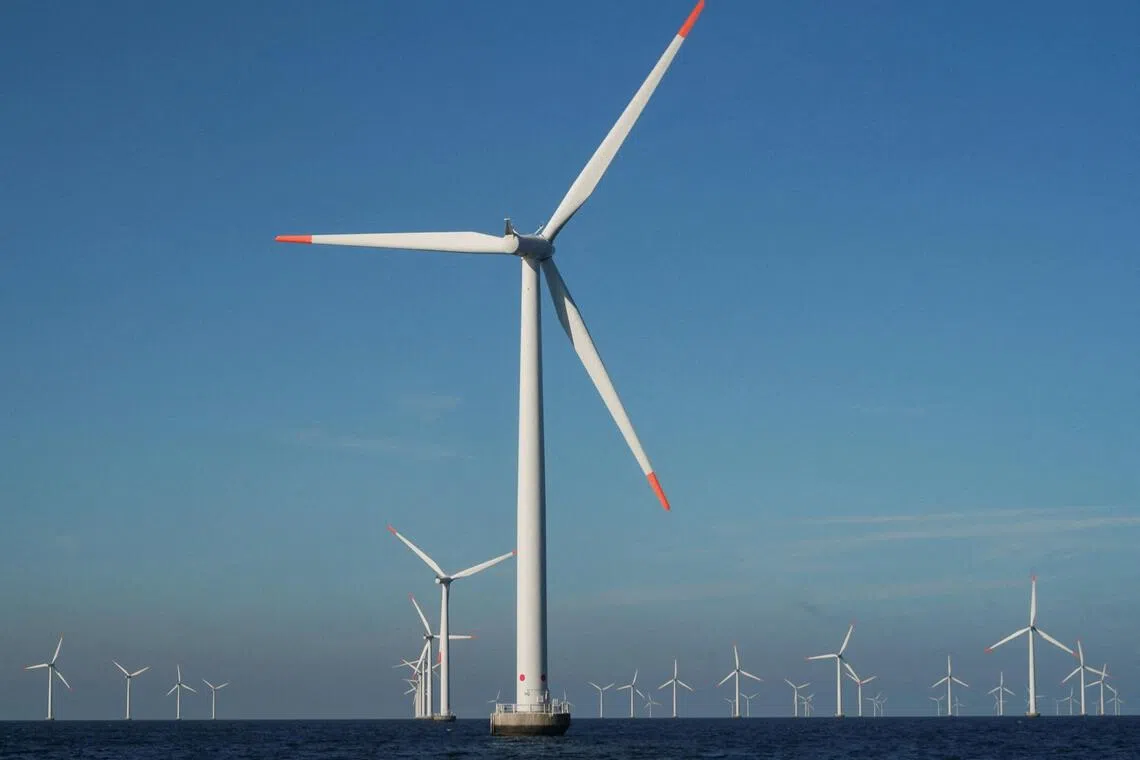Quantifying ocean benefits to climate goals can boost national efforts to protect marine ecosystems
Sign up now: Get ST's newsletters delivered to your inbox

Britain says more data is needed to protect its marine and coastal habitats, as it plans to boost offshore wind capacity.
PHOTO: REUTERS
Follow topic:
NEW YORK – If countries are to include ocean protection efforts in their plans to tackle climate change, they will need greater research to help them understand and quantify how these ecosystems can contribute to their goals.
This was a key message from several ministers speaking at a panel discussion held on Sept 22 during New York Climate Week – a series of events that kicked off across the city on Sept 21 to discuss sustainability initiatives.
Ms Mary Creagh, British Minister for Nature, said during the event at The Westin New York Grand Central hotel that Britain has included a number of ocean-related initiatives in its climate plans, such as efforts to boost offshore wind generation capacity.
Britain also recognises the importance of other marine and coastal habitats, such as wetlands and seagrass, Ms Creagh said.
“But we do not, in the UK, have enough data to really work out how seagrass and seaweed and coastal restoration can contribute and be scored in our NDC,” she added, referring to the nationally determined contributions, or climate pledges, that countries have to submit to the UN every five years.
A country’s NDC usually outlines how much planet-warming emissions it hopes to reduce by a target year, so a more nuanced understanding of how protecting marine habitats like mangroves or seagrass can contribute to this target will be key for governments to take more active steps in this area.
Ms Creagh said scientific research is ongoing in this area, and that Britain will share its findings with the global community when it is completed.
Ahead of the UN climate change conference COP30, which will be held in Brazil in November, countries have been asked to submit new climate targets for 2035.
The health of the ocean is critical to climate action, human health and overall well-being; however, it has not been actively discussed at the annual UN climate summits.
Other than being a source of seafood, recreation and a key transportation medium, the ocean also generates 50 per cent of the oxygen people need, absorbs 25 per cent of all carbon dioxide emissions, and captures 90 per cent of the excess heat generated by these emissions. Maritime transport moves more than 80 per cent of goods traded worldwide.
In June, Brazil, the host of COP30, and France, which hosted the UN Ocean Conference in Nice that month, launched the Blue NDC Challenge to encourage countries to include ocean protection initiatives in their NDCs ahead of the Brazil summit.
So far, 11 countries have responded to this challenge – Australia, Brazil, Britain, Chile, Fiji, France, Kenya, Madagascar, Mexico, Palau and Seychelles.
The panel discussion on Sept 22, hosted by environmental group Ocean Conservancy, the Ocean and Climate Platform coalition, and the US think-tank World Resources Institute, continued that call to action.
The Ocean and Climate Platform brings together organisations, including research institutes and non-governmental organisations, to bridge the gap between scientific knowledge and policymaking globally.
Countries that sign on to the Blue NDC Challenge must make plans to integrate the ocean into their NDCs.
This could include sustainably managing, conserving and restoring marine ecosystems; phasing out offshore oil and gas production; expanding clean ocean energy such as offshore wind, wave and tidal power; and supporting sustainable, climate-resilient fisheries and aquaculture, among other things.
Other country representatives who spoke on the panel included Chile’s director of environment, climate change and oceans, Mr Julio Cordano; Brazil’s Secretary of Multilateral Political Affairs Carlos Cozendey; Palau’s Minister of Agriculture, Fisheries and the Environment Steven Victor; and Australia’s chief climate negotiator, Dr Sally Box.
Mr Cordano said Chile is now trying to see how it can better measure the climate benefits from establishing marine protected areas.
The establishment of such areas is often thought to be a great boost for conserving biodiversity.
But Mr Cordano said better integration between climate and biodiversity goals is needed.
These are often treated as separate issues, although momentum is building for the two planetary crises of climate change and nature loss to be tackled together.
Climate change will also impact the ocean, he said, pointing to the effects of ocean acidification – caused by more planet-warming carbon dioxide dissolving into the ocean – on marine ecosystems.
“The NDC is the right place to be talking about these issues because these are climate processes, and we need to understand them,” Mr Cordano said.
Palau’s Mr Victor pointed out that for Pacific Islanders, the ocean is not just important for their lives and livelihoods, but is also an integral part of who they are.
“The ocean has this very intrinsic cultural value to me. But for others, they see a recreational area. And that gives me a sense of responsibility to continue to raise awareness because what I know is not what others know,” he said.
Mr Victor said Palau had begun developing ocean policies even before it accepted the Blue NDC Challenge, protecting ecosystems like mangroves, for instance.
“We protected them because we understood their ecological value. We understood their protection from ocean waves. We didn’t protect them just for blue carbon,” he said. Blue carbon refers to carbon stored by marine and coastal ecosystems.
Palau is a member of the Alliance of Small Island States (Aosis), which represents 39 low-lying coastal and small island developing countries, including Singapore.
Speaking to The Straits Times after the panel discussion, Mr Victor said the incorporation of ocean-related initiatives in another Aosis country’s climate plans must be “well thought out”.
“Every country is different – what works for Palau may not work for other small island states,” he said. “They need to really look at the science to guide them in understanding how (ocean initiatives) can help to reduce their emissions and, more importantly, the benefits that member countries can gain by investing in the ocean and nature-based solutions.”
He added that many small island developing states do not have enough financial resources or scientific capabilities to map out their coastal ecosystems.
“So it’s really about how we can develop international partnerships,” he added.
Singapore does not have any explicit mention of the ocean in its 2035 target. The Republic on Feb 10 committed to reducing its greenhouse gas emissions to between 45 million and 50 million tonnes (Mt) by 2035, down from around 60Mt in 2030.
This new climate target for 2035 puts Singapore on track to reach net-zero emissions by 2050,
However, under the Singapore Green Plan – a road map that lays out various ways the country is advancing sustainable initiatives – the Republic said it has plans to decarbonise harbour craft in Singapore’s port waters by, for example, making them fully electric, or compatible for use with net-zero fuels by 2030.


